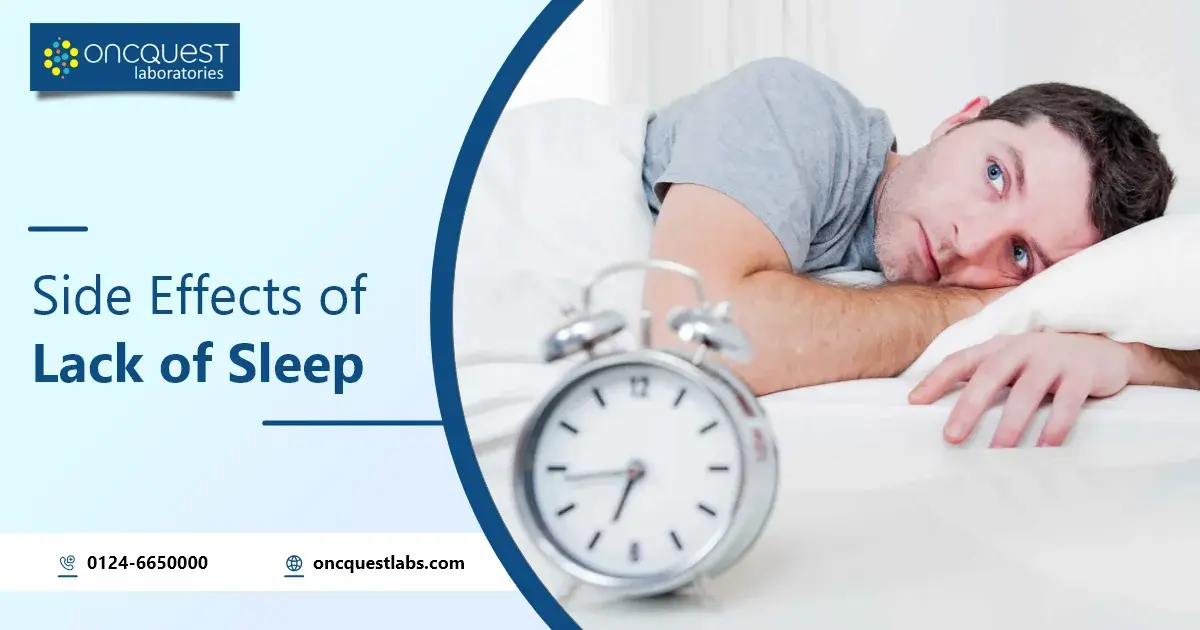In a fast-paced world where time is a precious commodity, sleep often finds itself relegated to the bottom of our priority list. However, the consequences of neglecting our nightly repose extend far beyond mere fatigue. Welcome to our exploration of the side effects of lack of sleep also known as sleep deprivation – a phenomenon that impacts not only our immediate well-being but also our long-term health. As we delve into the intricacies of what transpires when we fall short on our rendezvous with the Sandman, prepare to uncover the myriad ways in which a lack of sleep can cast a shadow over both our physical and mental vitality. Join us on this journey to illuminate the importance of embracing the restorative power of a good night’s sleep.
Contents
What is Lack of Sleep
Lack of sleep, also known as sleep deprivation, refers to a condition where an individual consistently receives insufficient or poor-quality sleep. This could result from various factors, such as lifestyle choices, work demands, medical conditions, or sleep disorders. Essentially, it involves not meeting the recommended amount of sleep required for optimal health and functioning. Chronic sleep deprivation can have a range of adverse effects on physical health, mental well-being, and overall cognitive performance. Understanding and addressing the causes and consequences of inadequate sleep is crucial for maintaining a healthy and balanced lifestyle.
Short-Term Effects
The short-term effects of sleep deprivation are immediate and can impact various aspects of our daily functioning. These effects include:
- Impaired Cognitive Function: Lack of sleep hampers attention, decision-making, and problem-solving abilities, leading to decreased overall cognitive performance.
- Mood Swings and Irritability: Sleep-deprived individuals often experience heightened irritability, mood swings, and increased emotional sensitivity.
- Reduced Immune Function: Sleep plays a vital role in supporting the immune system. Insufficient sleep can weaken the body’s defenses, making individuals more susceptible to illnesses.
Navigating daily tasks becomes more challenging when these short-term effects take hold, underscoring the importance of prioritizing adequate sleep.
Long-Term Effects
The long-term effects of persistent sleep deprivation extend beyond immediate challenges, impacting various aspects of physical and mental health. These include:
- Increased Risk of Chronic Conditions: Chronic sleep deprivation is linked to a higher risk of developing conditions such as obesity, diabetes, and cardiovascular diseases.
- Cardiovascular Implications: Prolonged lack of sleep may contribute to hypertension, heart disease, and other cardiovascular issues, affecting the overall health of the circulatory system.
- Impact on Mental Health: Long-term sleep deprivation is associated with an elevated risk of mental health disorders, including depression and anxiety. It can exacerbate existing conditions and contribute to the onset of new ones.
Understanding and addressing these long-term effects is crucial for maintaining overall health and well-being, emphasizing the importance of establishing healthy sleep patterns.
Performance and Productivity
The impact of sleep deprivation on performance and productivity is substantial, influencing both professional and academic spheres. Key aspects include:
- Effects on Work and Academic Performance: Sleep-deprived individuals often experience diminished concentration, memory lapses, and a decline in overall cognitive abilities. This can result in lower productivity at work and academic underperformance.
- Safety Concerns and Increased Risk of Accidents: Fatigue from lack of sleep is a significant contributor to workplace and traffic accidents. Impaired reaction times and reduced alertness heighten the risk of errors and mishaps.
Prioritizing sufficient and quality sleep is not just a matter of personal well-being; it directly correlates with enhanced performance, increased productivity, and a safer environment both in the workplace and during daily activities.
How To Reduce Side Effects Of Lack Of Sleep
To mitigate the side effects of sleep deprivation, consider adopting the following strategies:
- Establish a Consistent Sleep Schedule: Stick to a regular sleep routine by going to bed and waking up at the same time every day, even on weekends. This helps regulate your body’s internal clock.
- Create a Relaxing Bedtime Routine: Engage in calming activities before bedtime, such as reading a book, taking a warm bath, or practicing relaxation techniques. This signals to your body that it’s time to wind down.
- Optimize Your Sleep Environment: Ensure your bedroom is conducive to sleep by keeping it dark, quiet, and cool. Invest in a comfortable mattress and pillows to enhance overall comfort.
- Limit Exposure to Screens before Bed: Reduce exposure to electronic devices like smartphones and computers at least an hour before bedtime. The blue light emitted can interfere with the production of the sleep hormone melatonin.
- Watch Your Diet: Avoid heavy meals, caffeine, and nicotine close to bedtime. Opt for a light, healthy snack if you’re hungry before sleep.
- Exercise Regularly: Engage in regular physical activity, but try to finish your workout a few hours before bedtime. Exercise can promote better sleep, but intense activity too close to bedtime may have the opposite effect.
- Manage Stress: Practice stress-reducing techniques such as meditation, deep breathing, or yoga to help calm your mind before bedtime.
- Limit Naps: If you need to nap, keep it short (20-30 minutes) and avoid napping too close to bedtime.
If sleep problems persist, it’s advisable to consult with a healthcare professional to rule out any underlying sleep disorders or health issues. Prioritizing healthy sleep habits is crucial for overall well-being and can significantly reduce the impact of sleep deprivation.
Conclusion
In conclusion, the consequences of insufficient sleep extend far beyond mere fatigue. From the immediate cognitive challenges to the long-term risks to physical and mental health, the importance of prioritizing quality sleep cannot be overstated. By embracing consistent sleep patterns, creating conducive bedtime environments, and adopting stress-reducing practices, individuals can mitigate the adverse effects of sleep deprivation. Recognizing that ample, restorative sleep is a cornerstone of overall well-being is key. So, let us collectively commit to valuing our nightly repose, understanding that a good night’s sleep isn’t just a luxury but a fundamental investment in a healthier, more vibrant life.
Frequently asked Questions
Q1: Can you survive on 4 hours of sleep?
A1:No,Surviving on only 4 hours of sleep is not sustainable for the long term. While occasional nights of limited sleep may be manageable, chronic sleep deprivation can lead to cognitive impairment, mood disturbances, and increased health risks, emphasizing the importance of prioritizing sufficient rest for overall well-being.
Q2: Is 3 hours of sleep ok for one night?
A2: While a single night of 3 hours of sleep is survivable, it is far from ideal. Such short-term sleep deprivation can lead to impaired cognitive function, mood swings, and decreased alertness. Consistently getting inadequate sleep poses greater health risks, highlighting the importance of prioritizing sufficient rest for overall well-being.
Q3: How do you cure lack of sleep?
A3: Curing lack of sleep involves adopting healthy sleep habits. Focus on maintaining a consistent sleep schedule, creating a relaxing bedtime routine, optimizing your sleep environment, limiting screen time before bed, and managing stress. If sleep problems persist, consult with a healthcare professional to address potential underlying issues or consider behavioral interventions for better sleep hygiene.





